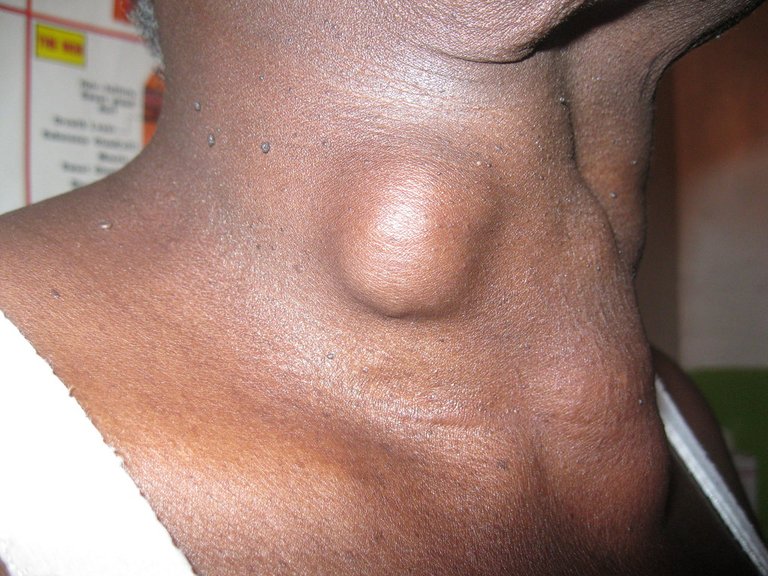Little But Important Organs (The Thyroid Gland )
The human body is complex and there are more than 70 organs in the body and it is not surprising when someone say they do not know about one organ or the other especially the small ones and such small one is the Thyroid but then when there is something wrong with the thyroid just like other organs, it becomes a problem.
The thyroid although a tiny butterfly looking structure wrapped around the windpipe can have great effect on the human body and mind. It is involved in a whole lot of bodily function especially metabolism as it secretes hormones. This metabolism has to do with converting our meal to energy and it all starts from the hypothalamus which is responsible for everything homeostasis in the body.
The hypothalamus releases the hormone Thyrotropin-Releasing Hormone which tell the body that it is hungry for energy and so more energy is needed. The hormone goes through the pituitary stalk to the pituitary gland which is then recieved by the Thyrotropin Cells in the pituitary gland. This glands then continue the job of keeping the body alive by releasing their own hormone which is the The Thyroid-stimulating hormone which then goes to the throat where the thyroid is located.
The thyroid makes the thyroid hormones which are in two form triiodothyronine (T3) and thyroxine (T4) which helps the body get energy, regulate weight, internal temperature, skin and hair, development of nail, and other metabolic function. Once the energy level is full, the hypothalamus stops releasing its hormone which triggers the Thyrotropin cells to also stop triggering their hormones and this leads to the thyroid gland stopping the production of the thyroid hormone.
While the thyroid looks like a very good small machine in the body, it cannot work alone to produce its thyroid hormones, it requires Iodine and people without iodine in their body can have thyroid related issues but in places where Iodized salt is used for cooking, then we are getting enough iodine to keep the thyroid good. Iodine is not the only reason why a person can suffer from thyroid related conditions, people can even be born with thyroid related diseases while it can also occur as people grow older.
Risk factors to having thyroid diseases include family history, having type 1 diabetes, being female at birth, and age above 60 years. people can suffer from hyperthyroidism where the gland is secreting too much thyroid hormone, or hypothyroidism where there is little to no thyroid hormone being released, it is known as hypothyroidism.
Whey the hormone is too high, the body begins to burn energy very fast leading to symptoms like anxiety, persistent thirst, mood swing, weight loss, and diarrhea. One of the causes is an autoimmune disease known as Grave's diseases where the immune system attacks and destroys the thyroid gland leading to an excessive release of the thyroid hormone.
In the case of hypothyroidism, the thyroid hormone is not released or not up to what is needed. This can lead to weight gain, depression, constipation, and tingling of the hands and feet. An autoimmune disease known as Hashimoto's disease can cause hypothyroidism. Thyroid disorders vary and are complicated and so are the symptoms ranging from fatigue, memory impairment, sensitivity to temperature, hair loss, loss of libido and so on. Iodine deficiency can present like hypothyroidism while over-consumption of iodine can lead to symptoms of hyperthyroidism.
In the case of hypothyroidism, giving the patient synthetic thyroid hormone replacement is an option in treatment while for hyperthyroidism, administering anti-thyroid medications or the use of radioactive iodine to damage the thyroid so it doesn't produce excessive thyroid.
Reference
https://www.ncbi.nlm.nih.gov/pmc/articles/PMC5483000/
https://www.ncbi.nlm.nih.gov/books/NBK500006/
https://www.ncbi.nlm.nih.gov/books/NBK499850/
https://pubmed.ncbi.nlm.nih.gov/31267667/
https://www.ncbi.nlm.nih.gov/pmc/articles/PMC2699000/
https://www.niddk.nih.gov/health-information/endocrine-diseases/hyperthyroidism
https://www.uptodate.com/contents/central-hypothyroidism/print
https://www.ncbi.nlm.nih.gov/books/NBK278978/
https://www.nhs.uk/conditions/underactive-thyroid-hypothyroidism/symptoms/
https://www.ncbi.nlm.nih.gov/pmc/articles/PMC10492440/
https://www.ncbi.nlm.nih.gov/pmc/articles/PMC8071026/
https://my.clevelandclinic.org/health/articles/22391-thyroid-hormone
https://www.ncbi.nlm.nih.gov/pmc/articles/PMC9459956/
https://www.thyroid.org/media-main/press-room/
https://www.ncbi.nlm.nih.gov/pmc/articles/PMC3019023/


It is an important knowledge to avoid problems in the future, you need to make sure your hormone levels are good in your blood.
Thanks for your contribution to the STEMsocial community. Feel free to join us on discord to get to know the rest of us!
Please consider delegating to the @stemsocial account (85% of the curation rewards are returned).
Thanks for including @stemsocial as a beneficiary, which gives you stronger support.